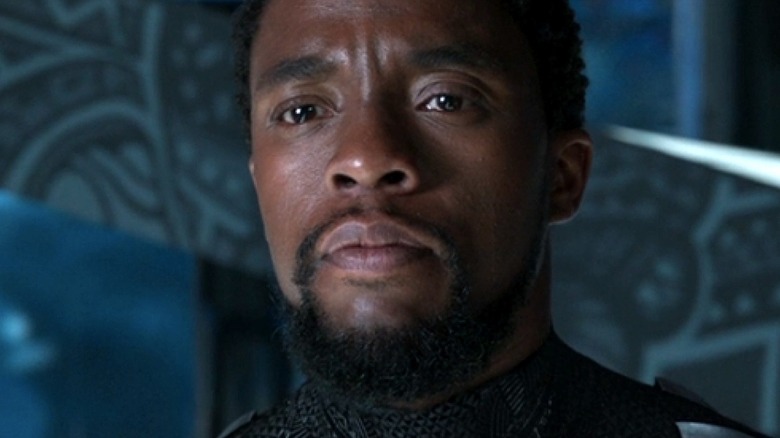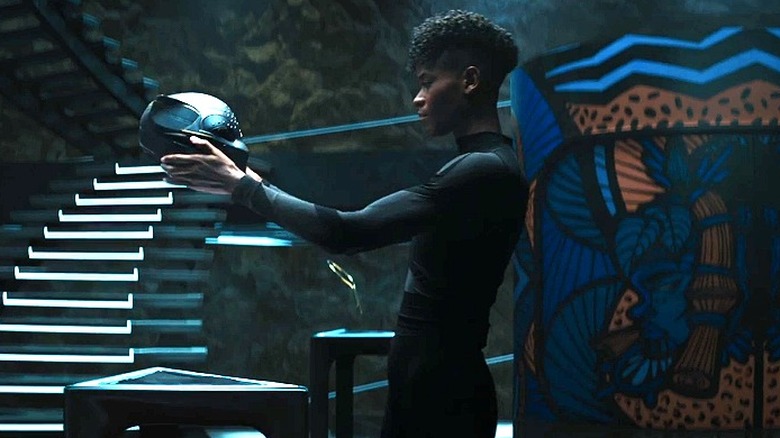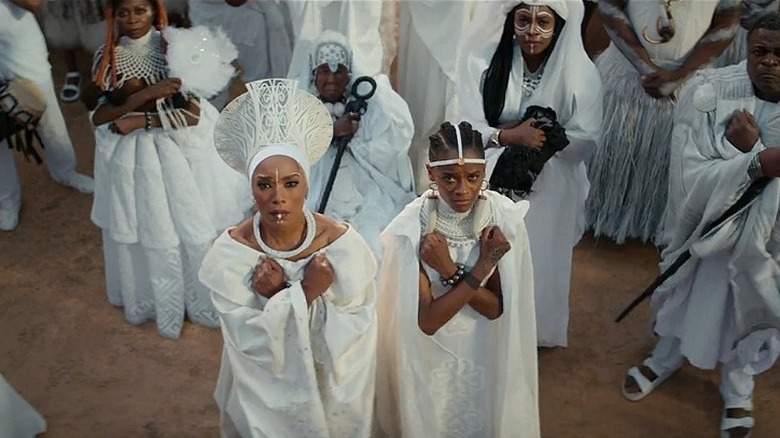Marvel Was Right To Not Name T'Challa's Illness In Wakanda Forever
In 2020, Ryan Coogler was penning the sequel to 2018's critically acclaimed "Black Panther" when Chadwick Boseman died of colon cancer. "I spent the last year preparing, imagining and writing words for him to say, that we weren't destined to see," the writer-director said in a statement (via Los Angeles Times) — a tribute to his friend and co-worker that touched on, among other things, the actor's belief in the cultural and social significance of the film.
As Coogler, along with Boseman's family, friends, and castmates, grappled with the unique pain and aftermath of losing their loved one, the artist knew he had a decision to make. Though his original script for "Wakanda Forever" did employ grief as a major theme, as he told Inverse, the narrative revolved around Boseman's protagonist T'Challa's struggle to resolve and deal with the loss of time. Thus, to continue the story Boseman so fervently believed in, Coogler would either have to recast his titular hero or rewrite the script in a way that honored the late actor and his legacy (without being insensitive or exploitative) and managed to make sense from a narrative standpoint. But if the decision not to recast Boseman was, for Coogler, a relatively easy one (as he revealed in "Wakanda Forever: The Official Black Panther Podcast," per Polygon), juggling the sensitive needs and enormous expectations of the sequel would be, by default, significantly more complicated.
While many elements of "Wakanda Forever" served the film's difficult task, the decision not to name T'Challa's illness speaks volumes about the care and thought that went into the critically lauded "Black Panther" sequel.
T'Challa's undisclosed illness helps the film find balance
In "Wakanda Forever," a newscast reports that T'Challa died from an "undisclosed illness." Though the sudden nature of the character's death — and the fact that, as Letitia Wright's Shuri says, he "suffered in silence" (per RadioTimes) — quietly mirrors Boseman's decision to keep his illness private, Coogler's decision not to have the character die of cancer was integral to the film's ability to thread an incredibly difficult needle.
Not acknowledging Boseman's death would have been a disaster on multiple levels. From a logistical/narrative standpoint, his character's absence required explanation, and from a fan and audience standpoint, plastering over the permanence and tragedy of the real-world event with a trite or temporary explanation for that absence would have been (at best) inadequate or false, and (at worst) an offensive disregard for the impact Boseman had on the first film, and the integral role he played in its cultural resonance. A proper on-screen send-off for his character was inarguably called for and, if done correctly, would prove a powerful means of creating an in-world space to recognize and honor real-world grief and gratitude.
But to write Boseman's reality too literally and directly into T'Challa's fictitious narrative would also have been a disaster on just as many levels, and for multiple reasons.
Wakanda Forever both honors and respects Boseman...
Attempting to erase the line between Boseman and just one of his many powerful characters would be to disregard the man himself, reduce his legacy, and imply that a fictional universe's fictional loss is the same as (or similar enough to adequately portray) the real-life loss suffered by those still mourning the man behind the character. By calling T'Challa's illness 'cancer,' "Wakanda Forever" would have been doing just that.
What's more, it would have been both exploitative (a cheap means of fleshing out its pathos) and a slap in the face to Boseman's and his family's decision (per Good Morning America) to keep his diagnosis and experience with the disease private. By not naming T'Challa's illness, "Wakanda Forever" both leaves room for it to be something other than cancer and quietly honors Boseman's choice.
In addition to respecting Boseman's wishes and maintaining a necessary distinction between the man and the character, calling it an "undisclosed illness" helped the film avoid the backlash experienced by another MCU installment, "Thor: Love and Thunder." As diseases go, cancer has the distinction of being, at once, something that impacts the lives of millions of people (with nearly 2 million new diagnoses and over 600 thousand deaths in 2022 alone, per the American Cancer Society) and something that tends — thanks to its wide range of types, stages, treatments, and even access to those treatments — to impact each of those millions of people in vastly different and specific ways. Perhaps this is why Hollywood has failed, time and time again, in its depiction of the disease (per Vice, NPR, and CNN).
...while focusing on its relevant theme
While fan response was divided about "Thor: Love and Thunder's" cancer narrative, a not insignificant contingent found it rushed, highly unrealistic, and ultimately offensive (per Survivornet and LADbible). While the comics explored Jane's specific diagnosis and treatment and the metaphor-rich science behind how certain chemotherapies work (via the destruction of any/all rapidly growing cells), the film, as The Mary Sue's Brittany Knupper writes, "decides to scrap most of that [and]...pushed so hard against one cancer patient trope [the victim] that it launched itself straight into another one [the martyr]."
Tackling cancer, a disease that prompts even those with the best of intentions to couch it in the harmful terminology of a "battle" (per Dana Farber), is difficult for any genre, but in films that rely on action-packed scenes and a hefty dose of plucky, lighthearted humor (like "Thor: Love and Thunder" does) it's nearly impossible to manage with the requisite degree of grace and authenticity.
In Coogler's film, the story's authenticity and power come not from a literal equation of T'Challa's death to Boseman's via the c-word, but from its investigation of grief. As Wired's Jason Parham writes: "...Those who remain find a way to fight, to heal. It's an age-old story, and tragically too real. It's one you've probably heard before. It's one that never loses meaning."
In focusing on the story, "Wakanda Forever" managed to honor Boseman and his legacy in numerous ways without disrespecting the man himself or disregarding the limitations of its genre — a move that, ultimately, served to elevate that genre as a whole.



